I Am What I Say I AmPosted in Articles, Census/Demographics, Identity Development/Psychology, Media Archive, United States on 2013-07-11 14:55Z by Steven |
Time Magazine
2001-03-18
According to Russell (my personal trainer by night, a lawyer by day, and a philosopher by disposition), I have white calves. Not white as in pasty, but as in Caucasian. My calves are–how to put it?–substantial, and their shape not only pegs me racially, Russell says, but also makes clear what kind of runner I would be (distance) if, say, hell were to freeze over and I were to take up that sport.
When I filled out my Census form last spring, the issue of my calves never came up. What did arise, however, was a new option that allowed Americans to claim identity in more than one racial group. When the result of this historic change was released last week, it showed that an unexpectedly large number of people had taken advantage of this choice: nearly 7 million, or 2.4% of the population. While the complexity of the outcome has sent demographers scrambling, I celebrate its promise.
Due to circumstances beyond my control (e.g., my birth), race is more plastic for me than for some. The catalog of purported racial characteristics I could assemble seems to be compounded rather than dissolved by my particular heritage: one black parent and one white.
Examples follow…
Read the entire article here.
